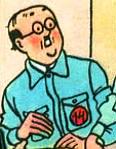Frank Wolff is a fictional character from The Adventures of Tintin series of classic comic books drawn and written by Hergé. Wolff appears in Destination Moon (1950-52) and Explorers on the Moon (1952-53).
Hergé described Wolff as clever, with an honorary master's degree in Mathematics with Mechanics, but also very feeble and quiet. He assists Tintin's friend Professor Calculus before and during the Syldavian expedition to the moon. However, Wolff is ultimately exposed as a spy who was coerced into helping an unnamed foreign power to hijack the moon rockets he had helped to build.
Background[]

Frank Wolff as seen in the book series
Frank Wolff was an engineer who originally worked at an atomic facility at White Sands in the United States (in the English-language version, it is named as an actual rocket proving ground). He was a compulsive gambler and fell into heavy debt. During a stay in New York City, he met a man who offered to pay off his debts in exchange for some harmless information concerning his work. Wolff agreed but, as time passed, he was asked for more sensitive secrets. At first he refused, but the pressure from his creditors meant that he had to give in.
(Although not named, the individual who offered the financial help to Wolff may have been Miller, the leader of the attempts to hijack the Syldavian rockets and who can be seen listening to the radio transmissions between Earth and the moon rocket in Explorers on the Moon.)
At heart a decent man, Wolff fled to Europe and put his past behind him. He eventually found employment on the Syldavian moon rocket programme at the Atomic Research Centre at Sbrodj ("Sprodj" in the English-language edition), an area within the Balkan kingdom, and became Calculus' dependable right-hand. He was a key figure in the development of the moon mission, being one of only three people to know the combination of the safe where the plans for the rockets were kept.
When Captain Haddock and Tintin arrived at the Centre, Wolff took them on a guided tour of the premises. As a scientist himself, he got a bit over-technical as to the workings of atomic batteries which went over Haddock's head, even if he tried not to show it.
Back into espionage[]
The spies who paid Wolff's debts managed to quickly track him down (in one scene Miller is shown checking a list of personnel at the Centre and presumably finds Wolff's name amongst them). They contacted Wolff, threatening to expose his past if he did not cooperate. Much against his will, Wolff went along.
At the time, he and Calculus were working on an experimental rocket named X-FLR6. It was to orbit the moon before returning to Earth with pictures of the other side, unseen from Earth. Wolff took microfilms of the plans and passed them to the spies via the Centre's air conditioning system. He was almost caught in the act by Captain Haddock whom he was forced to knock unconscious.
X-FLR6 was launched and, thanks to the plans provided by Wolff and passed on by Miller, the unnamed foreign power employing the spymasters was able to intercept it during its journey back to Earth. However, on Tintin's recommendation, Calculus had installed an auto-destruct mechanism aboard the rocket thus enabling it to be exploded at high altitude and thwarting the spies' plans.
Moon mission[]
Miller suspected that Wolff was responsible for the failure of the attempt to hijack the rocket and threatened to kill him. When it was announced that a new rocket was to be built which had the capability of actually taking people to the moon, Wolff was told that a journalist was going to be smuggled onboard and that his job was to help him in his task.
Wolff incurred the wrath of Captain Haddock by refusing to allow him to take any alcohol or tobacco into the rocket — although the captain managed to smuggle some bottles of his favourite libation on board anyway.
Wolff continued his work on the construction of the rocket and the suits needed for exploring the surface of the moon. Eventually he set off for the moon along with Tintin, Haddock, Calculus and Snowy. Also along for the ride were the lookalike detectives Thompson and Thomson who had taken it upon themselves to watch over the rocket before its launch, which they thought was scheduled for 1:34 p.m. rather than 1:34 a.m.
Wolff assisted Calculus in the handling of the rocket — turning it around as it approached the moon and positioning it to land in the centre of the Hipparchus moon crater.
Once on the moon, he assisted the "journalist" out of the crate in which he had been smuggled aboard. His actual identity was Colonel Boris, aka Jorgen, an enemy Tintin had met in the course of the theft of King Ottokar's Sceptre. Jorgen revealed that his real mission was to take the rocket back to the foreign power which was employing them both. It was apparently this bitter realisation which led Wolff to mishandle the controls of the rocket's ladder and airlock soon after the others had set foot on the moon. Tintin himself had noticed how on edge Wolff had been for some time, in contrast to the amiable mood he was in when they first met.
Wolff and Calculus then set about performing various experiments on the lunar surface and observing the stars from there. He also went exploring in the lunar tank with Tintin and Haddock.
Later, when the other members of the crew had departed in the lunar tank on an expedition that was to last two Earth days, Jorgen knocked Tintin and Snowy out and then pressured Wolff at gunpoint with the pistol he'd brought with him into launching the rocket in order to take it back to Earth, in spite of the scientist's objections to leaving the others behind. Just as it was taking off, the rocket crashed back onto the moon. Jorgen accused Wolff of sabotage and threatened to kill him, but the actual saboteur turned out to be Tintin, who intervened and took both men prisoner. Wolff's shame over how his failings had led to this escalation of events caused him to confess everything, beginning with his gambling debts.
On the return trip, Wolff and Jorgen managed to free themselves, as the bungling detectives had undone their rope bindings to use their handcuffs, believing those would be more secure. Jorgen had promised Wolff to let the others live, but he then went back on his word and announced that he was going to kill them anyway. Horrified, Wolff jostled Jorgen's gun arm and, in the struggle that followed, Jorgen's gun went off, killing him instantly when the bullet struck him in the heart.
Wolff was allowed to rejoin the others, though Haddock still suspected him of possible betrayal. Jorgen's body was cast into space — it was too dangerous to keep a dead body in the rocket with a diminishing air supply.
Wolff was still overcome with guilt over the way he had betrayed his companions. While the others were asleep to save oxygen, Wolff slipped away, wrote a note for the others, and let himself out of the airlock directly into space, hoping to thus leave them with enough air to get back to Earth. Even the cynical Haddock, who had, until the last moment, still suspected Wolff of treachery, was moved by his selfless act.
Suicide Note[]
Wolff's suicide note was first seen in the weekly Tintin magazine issue of 11 November 1953. In it, Wolff noted:
- Inutile de me rechercher, vous savez bien que j'aurai disparu a jamais dans l'espace.
(French for: "There is no need to look for me, you know that I will have disappeared forever into space.")
This was changed in the book edition to:
- Quant à moi, peut-être un miracle me permettra-t-il d'en réchapper aussi.
which is the English edition became:
- Perhaps by some miracle I shall escape too.
Hergé later indicated in an interview with Numa Sadoul that this comment was added against his will under pressure from the Catholic Church which was troubled by the concept of Wolff's suicide. He considered it a "stupid sentence" and noted that "No miracle was possible. Wolff was condemned and he knew it better than anyone."[1]
Trivia[]
Frank Wolff shares his name with an American actor best known for his roles in Spaghetti Westerns. Ironically, the real-life Wolff also committed suicide.
References[]
- ↑ Template:Cite video
